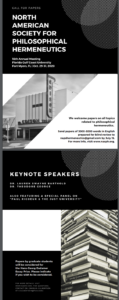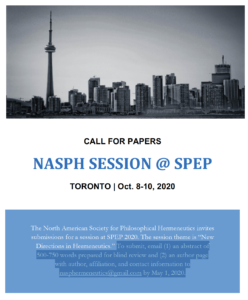CALL FOR PAPERS │ VOLUME XVI (2024)
HERMENEUTICS AND MELVILLE
Guest Editor: Christopher Hanlon, Arizona State University
“Champollion deciphered the wrinkled granite hieroglyphics. But there is no Champollion to decipher the Egypt of every man’s and every being’s face. Physiognomy, like every other human science, is but a passing fable. If then, Sir William Jones, who read in thirty languages, could not read the simplest peasant’s face in its profounder and more subtle meanings, how may unlettered Ishmael hope to read the awful Chaldee of the Sperm Whale’s brow? I but put that brow before you. Read it if you can.” — Moby-Dick, 1851 The literary corpus of the American novelist and poet Herman Melville (1819-1891) has not only been an object of interpretation in the 130 years since the author’s death; Melville’s texts themselves often make the very process of interpretation their subject matter. In Benito Cereno (1856), Amasa Delano’s failure properly to interpret the scene aboard the San Dominick symbolizes in a literal knot no one can untie—and which therefore one sailor tosses overboard. Much of the action of Bartleby, the Scrivener (1856) proceeds from the title character’s refusal simply to read a legal document (and in a novella that addresses directly the second-person “reader” with frequency, Bartleby himself becomes a “cipher” whose meaning frustrates the first-person narrator long before the story ends with the revelation of Bartleby’s prior employment at a dead-letter office: a facility for messages that are never received). And in the above quotation from Moby-Dick, Ishmael dilates the problem of reading the features and expressions of human faces to the prospect of discerning meaning in the white whale itself. Meaning and our vexed, halting access to it is fundamental and perennial for Melville and his writings. Analecta Hermeneutica invites submissions for a special issue on the potential connections between hermeneutical philosophy and the writings of Herman Melville. Potential subjects may include:
● the extent to which problems of interpretation drive Melvillean narrative;
● the ways Melville engages issues of hermeneutics as a wide-ranging reader of philosophies of meaning;
● Melville’s habits of processing biblical exegesis, the production of legal meaning, or metaphysical debate;
● Melville as a practitioner of what David Utsler and Cynthia Nielsen term “environmental hermeneutics” (which as they argue hones discussion of the Anthropocene to questions of “What it means, and by extension, how we should act” [Analecta Hermeneutica 13 (2021): 52]);
● interpretation and the vicissitudes of the body’s abilities;
● or the extent to which Melville’s legacies—including re-writings or refractions of his works— challenge, engage, or enrich hermeneutical understanding in these or other ways.
SUBMISSION DEADLINE AND GUIDELINES
Deadline: 01 January 2024 Send submissions to: AnalectaHermeneutica@asu.edu Please use “Analecta Hermeneutica Submission” as the subject of the email. All manuscript submissions should be written in English. Manuscripts should be anonymized for peer review, prepared in Microsoft Word using a 12-point common font, double-spaced, and between 6,000 and 9,000 words (inclusive of footnotes). Analecta Hermeneutica follows the Chicago Manual of Style (17th ed.); all citations should appear as footnotes. Long or explanatory notes should be kept to a minimum and every effort should be made to include substantial comments in the main body of the manuscript.
REVIEW PROCESS
In keeping with the journal’s practice, submissions will undergo rigorous peer review, including screening by the editors and review by at least two anonymous referees. Inquiries about this volume of Analecta Hermeneutica should include “Analecta Hermeneutica Queries” as the subject of the email and can be directed to Christopher Hanlon, PhD Guest Editor: christopher.hanlon@asu.edu

 For those interested, the North American Society for Philosophical Herme
For those interested, the North American Society for Philosophical Herme nto, Canda (Oct. 8-10). The panel’s theme is “New Directions in Hermeneutics.” The NASPH executive committee invites those interested to submit (1) an abstract of 500-750 words prepared for blind review and (2) an author page with author, affiliation, and contact information to nasphermeneutics@gmail.com by May 1, 2020. You may download the flyer
nto, Canda (Oct. 8-10). The panel’s theme is “New Directions in Hermeneutics.” The NASPH executive committee invites those interested to submit (1) an abstract of 500-750 words prepared for blind review and (2) an author page with author, affiliation, and contact information to nasphermeneutics@gmail.com by May 1, 2020. You may download the flyer